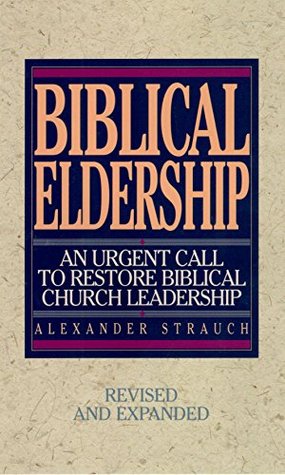More on this book
Community
Kindle Notes & Highlights
Started reading
August 20, 2018
“We have somehow got hold of the idea that error is only that which is outrageously wrong; and we do not seem to understand that the most dangerous person of all is the one who does not emphasize the right things.” (D. Martyn Lloyd-Jones, Sermon on the Mount, 2:244)
The elders protect, guide, lead, nourish, comfort, educate, and heal the flock by teaching and preaching the Word. Indeed, many pastoral needs of the people are met through teaching of the Word. The failure of church elders to know and teach the Bible is one of the chief reasons doctrinal error floods churches today and drowns the power and life of the church.
The pastor-teacher ministry is also one of the principle means by which the elders’ leadership and vision is communicated to the congregation, and the ability to communicate is one of the key requirements of effective leadership.
This ministry does not necessarily have to be exercised from the platform and the centre of gravity of the gifts of one elder may be towards teaching while that of another may be towards pastoring. But all need a sound grasp of the Faith and the ability to teach and instruct in small groups and one-to-one in the pastoral situation.
A healthy, growing flock of sheep doesn’t just appear; it is the result of the shepherd’s skillful management of sheep and resources. He knows sheep and is skillful in caring for them. A good shepherd elder knows people. He knows how sensitive they
are. He knows their needs, troubles, weaknesses, and sins. He knows how they can hurt one another. He knows how stubborn they can be. He knows how to deal with people. He knows that they must be slowly and patiently led. He knows when to be tough and when to be gentle. He knows peoples’ needs and what must be done to meet those needs. He knows how to accurately assess the health and direction of the congregation. And when he doesn’t know these things, he is quick to find answers. He loves to learn better skills and methods for managing the flock.
It is positively amazing how much people can accomplish when they are motivated to work for something they love.
And for tentmakers to survive three full-time jobs (work, family and ministry), they must also adopt a sacrificial lifestyle. Tentmakers must live a pruned life and literally find leisure and rest in the rhythm of serving Christ (Matt. 11:28). They must be willing to forego a measure of career achievement and private leisure for the privilege of gaining the prize (Phil. 3:14). Many would like to be tentmakers if they could be wealthy and live a leisurely and cultured lifestyle. But the truth is that a significant ministry in the church and the community can only come by sacrifice.11
Although the elders lead and are officially responsible for the spiritual oversight of the whole church, they are not the total ministry of the church. They are not the ministers. Ministry is the work of the whole church. Ministry is not the work of one person or even one group of people.
Furthermore, the deacons are the church’s ministers of mercy. Like the elders, they are to attend to the people’s many practical care needs (Acts 6:1-6). So the elders need to delegate to the deacons many of the practical mercy needs of the congregation.
I know some churches that sought to implement a biblical eldership but weren’t able to make it work effectively until they dropped the term elder and called their elders “pastors.”


